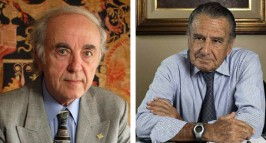Paying tribute to the unparalleled effort by the Danish people to rescue their Jewish compatriots from the Nazis
The facts speak for themselves. During WWII, Denmark was the only Nazi-occupied country which defied the German’s dictate to deport its Jewish population.
The evil epitomized by the Nazi cold-blooded systematic killing machine encountered a formidable match of goodness on the part of the Danish people, who collectively orchestrated an unparalleled effort to save innocent lives from a dreadful fate.
To be sure, life-saving acts were present all across Europe during the Shoah. People from all walks of life, nationalities, political ideologies, religious beliefs, including agnostics, did reach-out to the victims of the ruthless Nazi extermination machine. Diplomats, clergymen and civilians, throughout Europe acted in accordance to their individual conscience and stood up against evil.
At the International Raoul Wallenberg Foundation (IRWF) we have extensively researched this phenomenon. We are proud to have shed light on unknown stories of rescue leading to recognition of their heroic protagonists, who populate our worldwide educational programs aimed at instilling the legacies of these valiant saviors in the hearts and minds of the young generations. Despite the long time elapsed, we are still amazed to find more inspiring stories. Earlier this month, for instance, we paid posthumous tribute in Yerevan to Dr. Harutyun Khachatryan, an Armenian physician who went out of his way to save the life of a fellow Jewish inmate in a Nazi concentration camp. Similarly, we managed to identify rescuers from Poland, Hungary, Belgium, France and many other countries. Last June, for instance, we paid tribute in London to a singular British hero, aged 104, Sir Nicholas Winton, who is responsible for the rescue of 669 Czechoslovakian Jewish children by arranging their emigration to the UK, before the war broke out. Meeting Sir Nicholas was one of the most rewarding experiences we have ever had.
Our NGO is privileged to have honorary members from all backgrounds, including more than 300 heads of state, former and incumbent, and Nobel Prize laureates. President Shimon Peres and Chancellor Angela Merkel are amongst them, and one of our first members is Jorge Mario Bergoglio, nowadays better known as Pope Francis.
Raoul Wallenberg, the young Swedish diplomat who saved the lives of scores of Hungarian Jews is probably the most prominent example of human solidarity and empathy, but he was certainly not alone. So far, some 23,000 women and men have been officially recognized as Righteous among the Nations, but we know that this number represents only a small fraction of the multitude of rescuers, whose stories are still waiting to be unveiled.
Having said so, we have never encountered such a collective solidarity spirit as the one displayed by the Danish people in general and the Danish Resistance movement in particular.
If we were to liken Raoul Wallenberg to a virtuoso soloist, we should compare the Danish people to a magnificent philharmonic orchestra.
History teaches us that on September 28, 1943, a German diplomat by the name Georg Duckwitz, discreetly informed key members of the Danish resistance about the Nazis’ imminent plans to deport the Danish Jews. The Danes did not procrastinate. In just three days they launched an unprecedented nationwide effort to facilitate the smuggling of their Jewish compatriots by sea to Sweden. Within two weeks, some 7,200 Danish Jews and hundreds more of their non-Jewish family members were ferried to the neighboring Sweden with the help of the Danish fishermen.
In spite of this remarkable feat, almost 500 Danish Jews were left behind and eventually deported to the Theresienstadt ghetto in Czechoslovakia, but the Danes did not give up on them. They relentlessly pressured the Germans, succeeding in saving most of the Ghetto inmates.
This case shows us how the forces of free hatred collided with the forces of free love and in this case, the latter had the upper hand.
Inevitably, one starts to mull over a number of “what if” scenarios. What if other nations had acted the way the Danes did? What if more individuals had stood-up against evil the way Raoul Wallenberg, Irena Sendler or Angelo Roncalli (Pope John XXIII) did? How many innocent lives would have been spared?
It is our duty to teach their stories, to promote their legacies. We, humans are naturally prone to recognize evil. But why are we so numb when it comes to recognizing good deeds?
Last year, Raoul Wallenberg would have turned 100. That is why we have coined the “Raoul Wallenberg Centennial Medal”.
This week, at the Danish Royal Theater, a majestic venue, our Foundation is bestowing the “Raoul Wallenberg Centennial Medal” to the Danish people. The award will be conferred to Prime Minister Helle Thorning- Schmidt, on behalf of the heroes. Representatives from the rescuers and the survivors will be honoring the event with their attendance.
Seventy years after their awe-inspiring deeds, we shall have an opportunity to pay our tribute to the Danish saviors, expressing our eternal gratitude and our recognition of good. The collective heroism displayed by the Danes, merits to be remembered and cherished.
The International Raoul Wallenberg Foundation is a non governmental organization dedicated to developing educational programs and public awareness campaigns based on the values of solidarity and civic courage, ethical cornerstones of the Saviors of the Holocaust.

